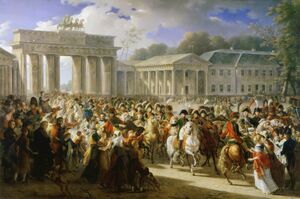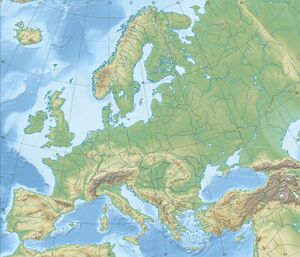سقوط برلين (1806)
| سقوط برلين | |||||||
|---|---|---|---|---|---|---|---|
| جزء من حرب التحالف الرابع | |||||||
 Entry of Napoleon into Berlin by Charles Meynier. Napoleon entering Berlin with the Brandenburg Gate in the background. | |||||||
| |||||||
| المتحاربون | |||||||
|
|
| ||||||
| القادة والزعماء | |||||||
|
|
| ||||||
الموقع داخل أوروپا | |||||||
سقوط برلين حدث في 24 أكتوبر 1806 حين تم الاستيلاء على العاصمة الپروسية capital of Berlin was captured by French forces in the aftermath of the Battle of Jena–Auerstedt. Berlin fell 15 days after the beginning of the war. The French Emperor Napoleon entered the city after three days, from which he issued his Berlin Decree implementing his Continental System. Large-scale plundering of Berlin took place.[2]
. . . . . . . . . . . . . . . . . . . . . . . . . . . . . . . . . . . . . . . . . . . . . . . . . . . . . . . . . . . . . . . . . . . . . . . . . . . . . . . . . . . . . . . . . . . . . . . . . . . . . . . . . . . . . . . . . . . . . . . . . . . . . . . . . . . . . . . . . . . . . . . . . . . . . . . . . . . . . . . . . . . . . . . .
الأعقاب
The subsequent Battle of Eylau, the Battle of Friedland and the Treaty of Tilsit compelled Prussia to cede large portions of its territories and accept French garrisons in its major fortresses and settlements. Prussia became a client state of France, forced to pay large indemnities, and Berlin itself remained occupied until early 1813. A garrison was also established at the nearby Spandau Citadel.
Following Napoleon's Retreat from Moscow in 1812, Prussian forces serving as auxiliaries for the French switched sides and supported Russia. This combined with major uprisings across Prussian territory, forcing French troops to retreat and abandon Berlin. The city then became a major target for the French who attempted to recapture it during the German campaign of 1813, ending only with the complete French withdrawal following the Battle of Leipzig.[2]
الوقع
Although Berlin had previously briefly been raided two times (in 1757 and 1760) during the Seven Years' War, its occupation was a major blow to the Prussian leadership. It destroyed the reputation the Prussian Army had gained during the days of Frederick the Great. After arriving in Berlin, Napoleon visited the tomb of Frederick and is reported to have said to his marshals "Hats off gentlemen, if he were alive we wouldn’t be here today". This became an iconic scene in German culture, portrayed in Prussian films such as Old Fritz (1927) and Kolberg (1945).[3]
In the wake of the fall of Berlin, a major reform movement was launched to restore the fighting effectiveness of the Prussian Army and renew the nation at large in order to plan a war of revenge against France.[4] The reformed Prussian forces playing a key role in the subsequent French retreat from Germany in 1813–14، وأثناء الهزيمة النهائية لناپليون في حملة واترلو في 1815.
الهامش
- ^ Clodfelter 2017, p. 150.
- ^ أ ب Leggiere 2002, p. 19.
- ^ Schulte-Sasse 1996, p. 111.
- ^ Carr & Hearder 2014, p. 11.
المراجع
- Carr, William; Hearder, Harry (2014). The Wars of German Unification 1864–1871. Routledge.
- Clodfelter, M. (2017). Warfare and Armed Conflicts: A Statistical Encyclopedia of Casualty and Other Figures, 1492–2015 (4th ed.). Jefferson, North Carolina: McFarland. ISBN 978-0-7864-7470-7.
- Leggiere, Michael V. (2002). Napoleon and Berlin: The Franco-Prussian War in North Germany, 1813. University of Oklahoma Press.
- Schulte-Sasse, Linda (1996). Entertaining the Third Reich: Illusions of Wholeness in Nazi Cinema. Duke University Press.
للاستزادة
- Chandler, David (1993). Jena 1806: Napoleon destroys Prussia. Bloomsbury.
- Roberts, Andrew (2014). Napoleon the Great. Penguin.
وصلات خارجية
 وسائط متعلقة بـسقوط برلين (1806) من مشاع المعرفة.
وسائط متعلقة بـسقوط برلين (1806) من مشاع المعرفة.
- صفحات بها مخططات
- Short description is different from Wikidata
- Pages using gadget WikiMiniAtlas
- Articles containing OSM location maps
- 1806 in Germany
- Conflicts in 1806
- October 1806 events
- 19th century in Berlin
- Battles of the Napoleonic Wars
- Military history of Berlin
- Battles involving Prussia
- Battles involving France
- Frederick William III of Prussia
- Battles of the Napoleonic Wars involving Prussia
- صفحات مع الخرائط
